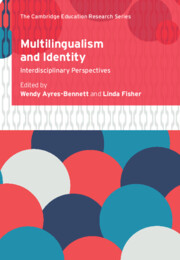Book contents
- Multilingualism and Identity
- Multilingualism and Identity
- Copyright page
- Contents
- Figures
- Tables
- Contributors
- 1 Towards Interdisciplinarity in Multilingual Identity Research
- Part I Situated Multilingualism and Identity
- 2 ‘Every Line Is a Lie’
- 3 Beyond ‘Narrating the Nation’
- 4 Metrolingual Practices and Distributed Identities
- 5 Migrants’ Identities in Multilingual Cities
- 6 Indexicalities in the Multilingual City
- 7 Multilingualism and Identity in Ningbo, China
- Part II Multilingual Identity Practices
- Part III Multilingual Identity and Investment
- References
- Index
5 - Migrants’ Identities in Multilingual Cities
Plurilingualism as Transformative Social Asset
from Part I - Situated Multilingualism and Identity
Published online by Cambridge University Press: 22 July 2022
- Multilingualism and Identity
- Multilingualism and Identity
- Copyright page
- Contents
- Figures
- Tables
- Contributors
- 1 Towards Interdisciplinarity in Multilingual Identity Research
- Part I Situated Multilingualism and Identity
- 2 ‘Every Line Is a Lie’
- 3 Beyond ‘Narrating the Nation’
- 4 Metrolingual Practices and Distributed Identities
- 5 Migrants’ Identities in Multilingual Cities
- 6 Indexicalities in the Multilingual City
- 7 Multilingualism and Identity in Ningbo, China
- Part II Multilingual Identity Practices
- Part III Multilingual Identity and Investment
- References
- Index
Summary
The ways in which migrants express, construct and negotiate their identities reveal a dynamic interplay between their discourses on how they relate to the world and the representations that shape their sense of belonging. In urban contexts, individuals’ plurilingual repertoires and transnational identities display the constant mediation migrants are involved in when they navigate their social trajectories. Migrants’ plurilingual repertoires and practices emphasize the role of language(s) in the exercise of power and illustrate how urban spaces participate in sociolinguistic stratification. However, by crossing borders between languages, cultures and spaces, migrants counterbalance the effects of the segregation that cities may impose on them and set in motion new complex plural affiliations to re-appropriate their life stories. In doing so, they break away from dominant homogeneous social discourses; they cut across the traditional deficit perspective associated with their language practice and give value to plurilingualism.
- Type
- Chapter
- Information
- Multilingualism and IdentityInterdisciplinary Perspectives, pp. 91 - 108Publisher: Cambridge University PressPrint publication year: 2022

